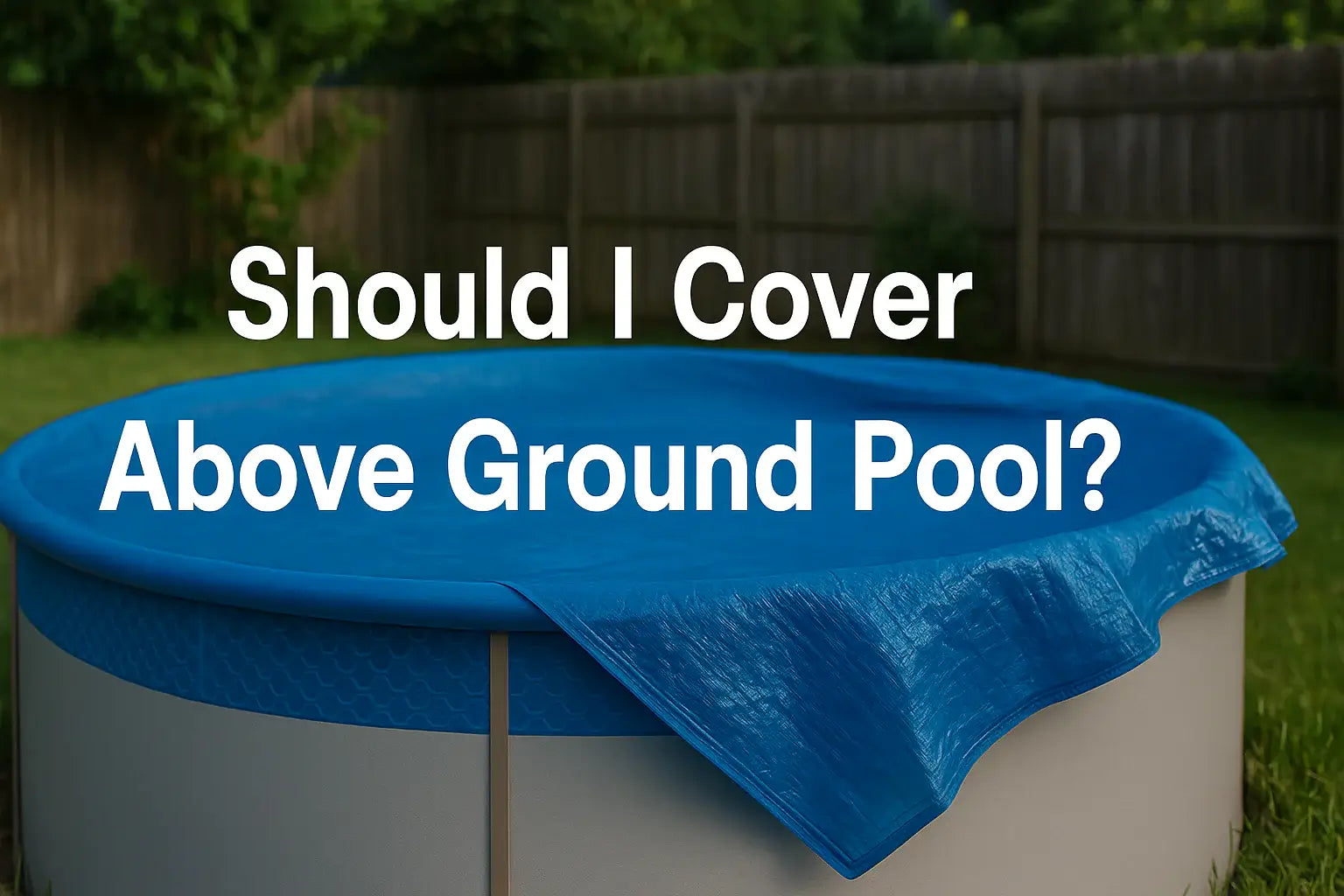
Should I Cover Above Ground Pool?
Should you cover your above ground container pool? Absolutely! A cover keeps out leaves, saves water, and makes it safer for everyone.
Think less time fishing out soggy twigs and more time floating on an inflatable flamingo.
Stick with me, and I’ll walk you through the easy wins, smart tips, and the best covers to keep your pool sparkling all year round.
Should Above Ground Pools Be Covered? The Numerous Benefits
Protection from Debris and Contamination
Keeping Out Leaves, Twigs, and Insects
Picture this: it’s a hot Saturday afternoon, you’ve got your swim gear on, and the kids are bouncing with excitement — only to find your pool has turned into a giant salad bowl of leaves and bugs.
A good cover stops that from happening. It keeps twigs, insects, and all sorts of debris out, meaning your water stays cleaner for longer and your filter doesn’t have to work overtime.
Reducing the Risk of Algae Growth (by Blocking Sunlight)
Algae loves warm, sunny water. By cutting off its sunlight supply, a cover slows down its growth dramatically. Less algae means fewer chemical treatments, less scrubbing, and more stress-free swims.
Less Time Spent Skimming and Vacuuming
Every bit of debris you keep out is time saved cleaning later. Instead of spending your Sunday morning with a pool net, you can be floating with a cold drink in hand.

Savings on Water, Chemicals, and Energy
Minimising Water Evaporation
On hot days, pools lose water fast — even when you’re not using them. A cover reduces evaporation, helping keep your water levels stable and saving you from constant top-ups.
Reducing Chemical Loss from UV Rays and Evaporation
The sun doesn’t just heat your pool; it eats away at your chlorine too. By blocking those UV rays, a cover keeps your sanitiser working longer and saves you money on chemicals.
Retaining Heat and Lowering Heating Costs (Especially with Solar Covers)
A solar cover works like a giant blanket, trapping warmth in the water overnight. It means fewer shivers when you get in and less money spent on heating. In sunny weather, you might even gain a few degrees for free.
Safety and Longevity
Providing a Barrier for Children and Pets (With Proper Safety Covers)
Pools can be a real hazard for curious little ones and adventurous pets. A proper safety cover is like a locked gate — it keeps everyone out unless you’re ready for a swim.
Protecting the Liner from UV Damage and Wear
Pool liners fade and weaken when exposed to sunlight all day. A cover acts like a shield, protecting your investment so it lasts longer and looks better.
Shielding the Pool from Harsh Weather Conditions
From heavy rain to gusty winds, a cover takes the brunt of the bad weather so your pool doesn’t have to. Less damage now means fewer costly repairs later.

Choosing the Right Cover for Your Needs
Types of Covers and Their Primary Uses
Solar Covers: For daily use, heat retention, and evaporation control.
These bubble-wrap-style covers are great for day-to-day use in the warmer months. They help trap heat and cut down on water loss.
Winter Covers: Designed for long-term use and protection from harsh winter elements.
If your pool takes a break over winter, a heavy-duty winter cover keeps it safe from leaves, frost, and other cold-weather trouble.
Safety Covers: Provides a secure barrier to prevent accidental falls.
Made to handle weight and tension, safety covers offer peace of mind for households with children or pets.
Leaf Nets: Placed over other covers to simplify fall cleanup.
If autumn turns your garden into a leaf factory, a leaf net makes clean-up quick and easy.

Factors to Consider When Selecting a Cover
Your Climate and Season of Use
If you live somewhere windy or prone to storms, a sturdy, anchored cover is worth it. For sunny areas, a solar cover might give you more value.
Your Budget and Maintenance Preferences
You get what you pay for. A cheap cover may save you money upfront, but a stronger, longer-lasting one will often save more in the long run.
The Size and Shape of Your Pool
Sounds obvious, but measure before you buy. A cover that’s too small won’t protect properly, and one that’s too big will flap around in the wind.
The Importance of a Snug and Secure Fit
A tight, well-fitted cover stays in place, stops debris getting in, and avoids annoying flapping noises on breezy nights.
Have you checked out our other posts?
How To Cool Above Ground Pools?
How to Winterize Above Ground Pool?
How To Drain Above Ground Pool?
How To Level An Above Ground Pool?
When Closing Above Ground Pool?
How Many Hours A Day Should An Above Ground Pool Run?



Leave a comment